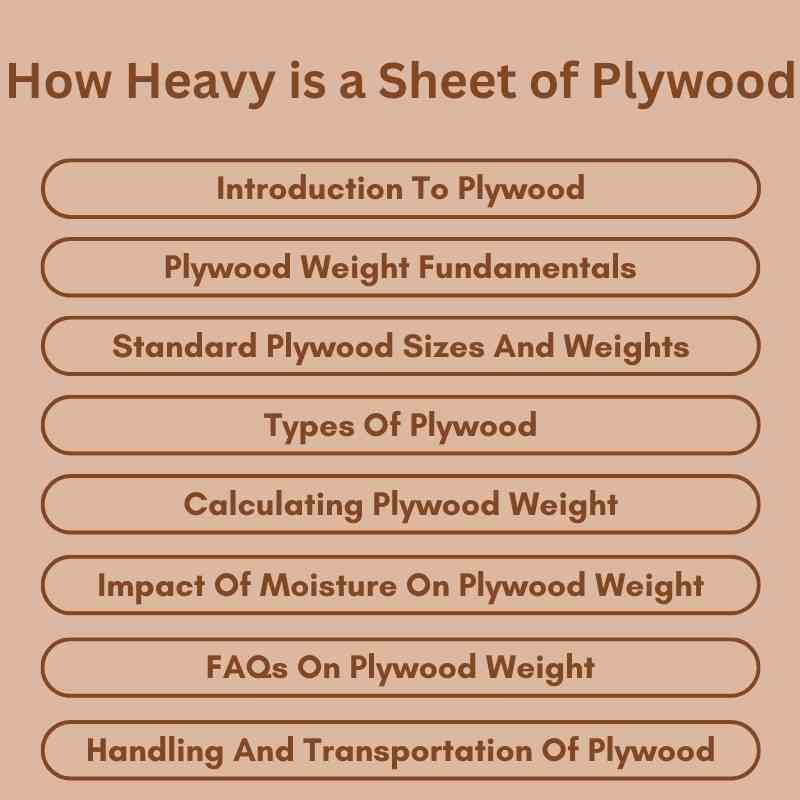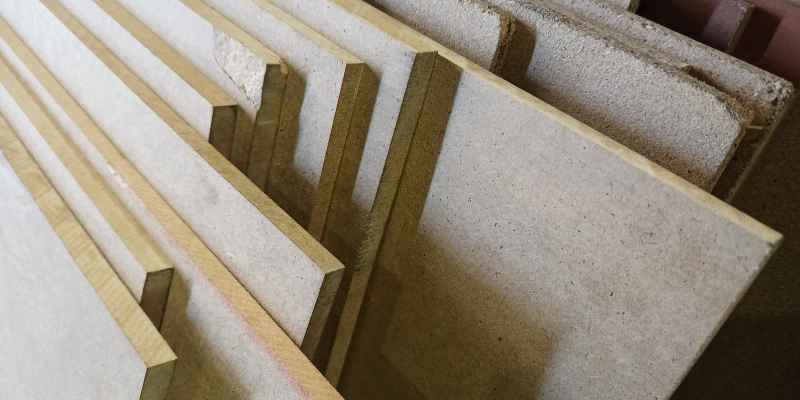How Heavy is a Sheet of Plywood?: Unveiling Facts
A standard sheet of plywood typically weighs between 30 to 50 pounds, depending on its thickness and type. Thicker sheets, like 3/4 inch, weigh more than thinner ones, such as 1/4 inch.
Plywood is a versatile and widely used material in construction and furniture making. It consists of multiple thin layers of wood veneer glued together, providing strength and durability. Builders and DIY enthusiasts often choose plywood for its lightweight nature and ease of handling.
The weight of a plywood sheet varies based on its dimensions, thickness, and wood species. Understanding plywood’s weight helps in planning transport and installation. Knowing these factors ensures you select the right type for your project, making it essential for both professionals and hobbyists.
Introduction To Plywood
Plywood is made from thin layers of wood. These layers are glued together. This process makes plywood strong and durable. Many builders use plywood in construction.
It is lightweight yet sturdy. This makes it easy to handle. Plywood comes in different sizes and thicknesses. The weight of a sheet depends on these factors.
Common thicknesses are 1/4 inch, 1/2 inch, and 3/4 inch. A 4×8 foot sheet weighs around:
| Thickness | Weight (lbs) |
|---|---|
| 1/4 inch | 20-25 |
| 1/2 inch | 30-35 |
| 3/4 inch | 40-50 |
Using the right plywood is essential for projects. It can enhance strength and stability.

Plywood Weight Fundamentals
Plywood weight depends on various factors. These include thickness, type, and moisture content. Thicker sheets weigh more than thinner ones. Different types of plywood also have different weights. For instance, hardwood plywood is typically heavier than softwood plywood.
Moisture content plays a role too. Plywood with higher moisture content is heavier. Weight varies by the type of plywood:
| Plywood Type | Weight (per 4’x8′ sheet) |
|---|---|
| Softwood Plywood | 30-40 lbs |
| Hardwood Plywood | 40-60 lbs |
| Marine Plywood | 50-70 lbs |
Understanding these factors helps in selecting the right plywood. Always consider the project needs and weight limits.
Standard Plywood Sizes And Weights
Standard plywood sheets come in various sizes and weights. The most common thicknesses are 1/4″, 1/2″, 3/4″, and 1″. Each thickness affects the overall weight of the sheet.
| Thickness | Weight per Sheet (4′ x 8′) |
|---|---|
| 1/4 inch | Approx. 20 lbs |
| 1/2 inch | Approx. 30 lbs |
| 3/4 inch | Approx. 50 lbs |
| 1 inch | Approx. 70 lbs |
Weight can vary based on wood type. Common types include pine, oak, and birch. Always check the manufacturer’s specifications for accurate weights.
Types Of Plywood
Calculating Plywood Weight
To find the weight of plywood, use this simple formula:
Common density values for plywood are:
- Softwood: 30-40 lbs/ft³
- Hardwood: 40-50 lbs/ft³
For a practical example, consider a 4′ x 8′ sheet of 3/4 inch plywood.
Using a density of 40 lbs/ft³:
| Measurement | Value |
|---|---|
| Thickness | 0.75 ft |
| Area | 32 ft² |
| Weight | Weight = 0.75 × 40 × 32 = 960 lbs |
This means the sheet weighs approximately 60 lbs.
Impact Of Moisture On Plywood Weight
The moisture content in plywood affects its overall weight. Plywood absorbs water from the air. This absorption can make it heavier. High humidity levels lead to more moisture in the wood. A sheet with high moisture may weigh significantly more.
To prevent water damage, proper storage is crucial. Keep plywood in a dry and well-ventilated area. Use a plastic cover to protect it from rain. Avoid placing plywood directly on the ground. Always elevate it with supports or palettes. Regularly check for signs of damage or warping.
Handling And Transportation Of Plywood
Handling plywood safely is very important. Always wear protective gear such as gloves and goggles. This helps prevent injuries during lifting and moving.
Use proper lifting techniques. Bend your knees and keep your back straight. Lift with your legs to avoid strain.
For transportation, secure the plywood properly. Use straps or ropes to prevent shifting during movement. This keeps everyone safe on the road.
Consider using dollies or hand trucks. These tools make moving heavy sheets easier. For larger loads, using a pickup truck or trailer is best.
Plan your route ahead of time. Avoid narrow spaces and low doorways. This helps prevent damage to the plywood and your vehicle.
FAQs On Plywood Weight
Choosing the right plywood involves understanding its weight and thickness. Thinner sheets weigh less, making them easier to handle. Common thicknesses are 1/4 inch, 1/2 inch, and 3/4 inch. Each thickness affects weight significantly.
For example, a 3/4 inch sheet of plywood can weigh about 60 pounds. A 1/4 inch sheet, on the other hand, may weigh only 15 pounds. Consider your project’s needs when selecting the plywood type.
To reduce plywood weight, consider using hollow core plywood. This type contains voids within, making it lighter. Another option is to use laminated veneer lumber. It offers strength without extra weight.

Frequently Asked Questions
How Much Does A Standard Sheet Of Plywood Weigh?
A standard 4×8 foot sheet of plywood typically weighs between 40 to 80 pounds. The weight depends on the thickness and type of plywood. For instance, a 1/2-inch thick sheet of plywood usually weighs around 50 pounds. Thicker sheets, like 3/4-inch, weigh significantly more.
What Factors Influence Plywood Weight?
Several factors influence plywood weight, including thickness, type of wood, and moisture content. Thicker sheets naturally weigh more. Different wood species, such as birch or pine, also have varying densities. Additionally, moisture absorbed by the plywood can increase its weight substantially.
Is Plywood Heavier Than Mdf?
Generally, plywood is lighter than MDF (Medium-Density Fiberboard). While plywood weighs around 40 to 80 pounds per sheet, MDF can weigh up to 90 pounds or more for a similar size. The manufacturing process of MDF makes it denser, contributing to its heavier weight.
Can You Estimate Plywood Weight Easily?
Yes, estimating plywood weight can be straightforward. You can use the formula: weight = density × volume. For example, a 3/4-inch thick sheet of plywood has a volume of 32 cubic feet. Knowing the average density of the type of plywood helps you calculate its weight accurately.
Conclusion
Understanding the weight of a sheet of plywood is essential for various projects. It influences transportation, installation, and overall structural integrity. Knowing the weight helps in making informed decisions. Always consider thickness and type when choosing plywood for your needs.
This knowledge ensures your projects are safe and successful.







